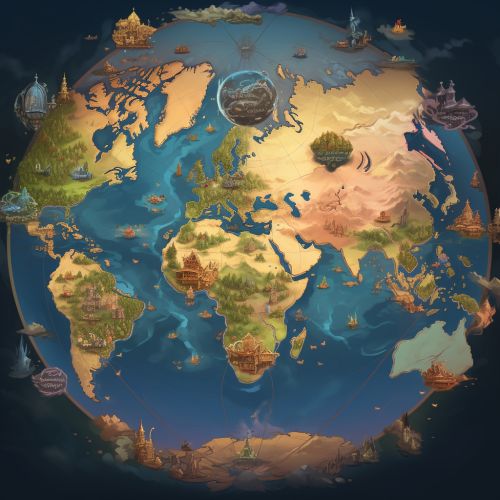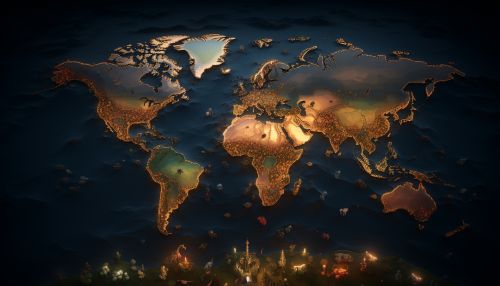Geopolitics
Introduction
Geopolitics is a field of study that analyzes the effects of geography (human and physical) on politics and international relations. While the term was originally coined by Rudolf Kjellén, a Swedish political scientist, it has been developed and expanded upon by numerous scholars and theorists throughout history. The study of geopolitics often involves looking at the interaction between power, territory and space at various levels.


History of Geopolitics
The concept of geopolitics has its roots in the works of several early political theorists, such as Friedrich Ratzel and Halford Mackinder. However, it was not until the 19th and 20th centuries that geopolitics began to emerge as a distinct field of study. This was largely due to the influence of Sir Halford Mackinder, a British geographer who is often credited as the founder of modern geopolitics.
Early Theories
The earliest geopolitical theories often focused on the importance of location and physical geography in determining political outcomes. For example, Friedrich Ratzel, a German geographer, proposed the idea of Lebensraum, or "living space," which suggested that a state's political power was directly related to the amount of space it occupied.
Sir Halford Mackinder, on the other hand, proposed the Heartland Theory, which suggested that the control of the "Heartland" (the central part of the Eurasian continent) was key to achieving global dominance. This theory was later expanded upon by Nicholas Spykman, who proposed the Rimland Theory, arguing that the coastal fringes of Eurasia were the key to global power.
Geopolitics in the 20th Century
The 20th century saw a shift in the focus of geopolitical theories. While location and physical geography remained important, there was an increasing emphasis on economic factors, technological developments, and ideological conflicts. This shift was largely driven by the two World Wars and the subsequent Cold War, which highlighted the importance of economic and ideological factors in international relations.
During the Cold War, geopolitics was often framed in terms of a bipolar world, with the United States and the Soviet Union as the two superpowers. This period saw the development of theories such as the Domino Theory, which suggested that the fall of one country to communism would lead to the fall of neighboring countries.
Modern Geopolitics
In the post-Cold War era, the field of geopolitics has continued to evolve. Today, geopolitics often involves the study of complex networks of economic, political, and social relationships that span the globe.
Globalization and Geopolitics
The process of globalization has had a significant impact on geopolitics. As countries become more interconnected, the geopolitical landscape has become increasingly complex. This has led to the development of theories that focus on the role of global networks and interdependencies in shaping political outcomes.
For example, the concept of geoeconomics has emerged as a key aspect of modern geopolitics. Geoeconomics focuses on the use of economic instruments to achieve geopolitical goals. This includes strategies such as economic sanctions, trade agreements, and the manipulation of currency exchange rates.
Technology and Geopolitics
Technological developments have also had a significant impact on geopolitics. The rise of the internet and digital technologies has led to the emergence of cyber geopolitics, which focuses on the geopolitical implications of information and communication technologies.
In addition, advances in energy technology, such as the development of renewable energy sources, have led to shifts in the geopolitical landscape. For example, the rise of renewable energy has the potential to disrupt traditional energy geopolitics, which has often been centered around fossil fuels.
Geopolitical Theories and Concepts
There are several key theories and concepts that are commonly used in the study of geopolitics.
Realism
Realism is a theory of international relations that assumes that states are the primary actors in international politics and that their actions are driven by self-interest. Realists often view the international system as anarchic and believe that states must rely on their own resources and capabilities to ensure their survival.
Liberalism
Liberalism is another key theory in international relations. Unlike realism, liberalism emphasizes the role of international institutions and cooperation in shaping political outcomes. Liberals believe that states can achieve their goals through cooperation and that international institutions can help to mitigate the anarchic nature of the international system.
Constructivism
Constructivism is a theory that emphasizes the role of ideas, norms, and culture in shaping political outcomes. Constructivists argue that state behavior is not simply determined by material factors, but is also shaped by social and cultural contexts.
Conclusion
Geopolitics is a complex and multifaceted field of study that combines elements of geography, politics, economics, and sociology. It is a field that is constantly evolving, as new theories and concepts are developed in response to changes in the global political landscape. Despite its complexity, the study of geopolitics is crucial for understanding the dynamics of international relations and the forces that shape our world.
